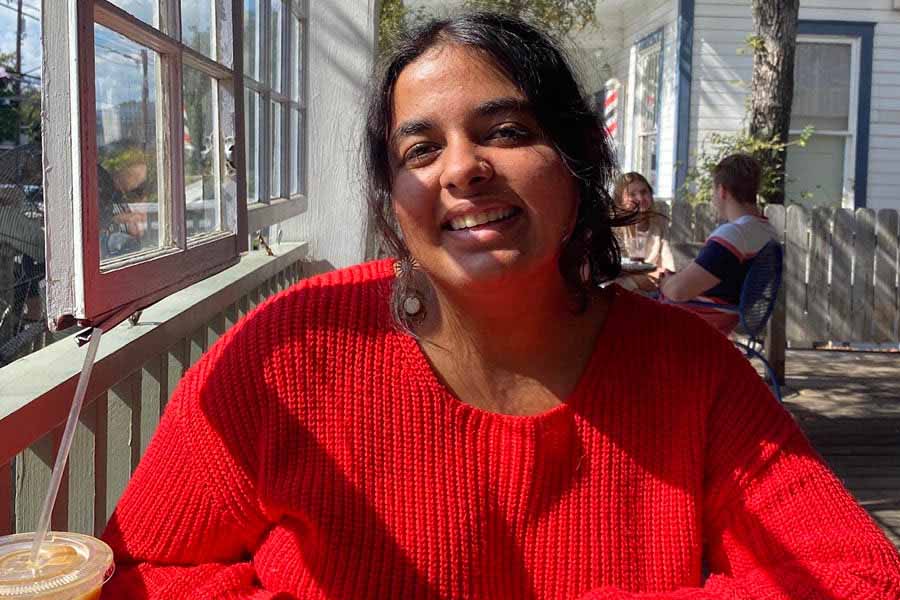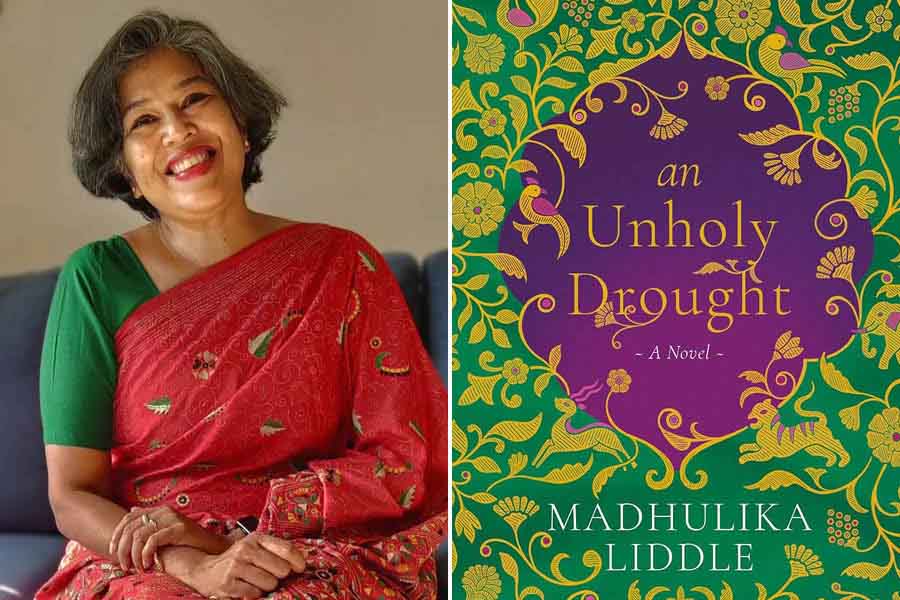I read Sanjana Thakur’s short story, Aishwarya Rai, just as I started to see my fights with my mother as a daily ritual. Aishwarya Rai follows a young woman named Avni as she tries to find a perfect mother in a shelter that houses women who have been abandoned or yearn to be mothers. Standing out from a pool of 7,359 entries, the story won the 2024 Commonwealth Short Story Prize.
“As I grow older, I have a lot of empathy for my mother,” says Sanjana, 26, over video call. She was joining me from New York, where she was visiting friends after graduating from the MFA in Fiction programme at the University of Texas at Austin’s New Writers Project. “I turned 23, and I hit the age [my mother] was when she was married. This year, I turned 26, and that’s the age at which she had me. I think about that a lot as I write. I feel so young, and the fact that she was a wife and a mother when she was my age — it blows my mind… I can’t wrap my head around it.”
Each mother has flaws and limitations, proving that the idealised image of motherhood is not just unattainable but also burdensome
In Sanjana’s story, the metaphor of the shelter for women unravels the frequently unattainable expectations that society places on mothers. Sanjana reconstructs the shelter as a marketplace where daughters can pick mothers, choosing them based on beauty, cleanliness or parenting style, as if they are commodities that can be replaced and traded in for better models. Each mother in the shelter embodies a specific societal ideal — the perfectly clean mother, the beautiful but emotionally distant mother, and the loving but sorrowful mother — accentuating the pressure on mothers to meet a litany of conflicting expectations. Avni’s journey through the shelter underlines the impossibility of finding a perfect mother. Each mother has flaws and limitations, proving that the idealised image of motherhood is not just unattainable but also burdensome.
“I think a lot of my stories grapple with the expectations that mothers and daughters have of each other,” says Sanjana, whose writing seems to stem from a deeply personal place, reflecting her own experiences and feelings about family, culture and gender roles. “There’s this sense of being deeply entangled, but you also have to reckon with the fact that your mother had a life before you — she was a whole person. As you grow, you’re trying to become your own person, and you realise how much of that journey is intertwined with your mother’s.”
This raw realisation courses through the mother-daughter dynamic in works like Annie Ernaux’s A Woman’s Story, Avni Doshi’s Girl in White Cotton, and Carmen Maria Machado’s Her Body and Other Parties, marking it as a recurring theme in women’s writing. I asked Sanjana why it’s a bond women writers gravitate to: “I think a part of it must be that, obviously, most women are mothers or daughters, or both. And even if you have a good relationship with your mother, it’s hard for that relationship to be completely uncomplicated.” Sanjana, again, insists on associating this with the societal expectations placed on mothers and daughters: “As women grow older and gain a sense of their mothers’ lives and start envisioning their own future, there’s often a sense of loss or grief. Thinking about what your mother might have sacrificed for you, the life she had before you, and the choices she made once she had you can be profound. People are trying to make sense of these complexities and grappling with difficult questions about how to navigate and understand this relationship.”
The reality of Aishwarya Rai as a professional, surrounded by a team of stylists and assistants, shatters the idealised image Avni had carried

The protagonist of Sanjana’s story is in search of a mother who embodies perfect femininity, similar to the image projected by Aishwarya Rai TT archives
The image of Aishwarya Rai is the perfect playground for these ideas, allowing Sanjana to connect Rai to the misguided notion that women can be ‘perfected’ through consumerism. “I think the role that [Aishwarya Rai] plays in the story is to offer you this sense of someone considered to be a perfect woman, an ideal woman. And because of that image, she can tell other women, ‘You could look like me, too. You could be like me, too, if you just buy this thing, if you just use this thing’.”
In Sanjana’s short story, Avni repeatedly fantasises about Rai rescuing her, taking her away from her difficult life and her imperfect mother. This bubble bursts when she meets the real Rai at a photoshoot. The reality of Rai as a professional, surrounded by a team of stylists and assistants, shatters the idealised image Avni had carried. When Avni tries to make eye contact with her (spilling tea on herself in the process), Rai asks Avni to leave through an intern who tells Avni that she’s ‘scaring’ Rai, as if the presence of a graceless girl shatters Rai’s spotless femininity.
In the short story, Rai eats a Caesar salad as her assistant carefully tears the romaine lettuce into smaller bites to avoid smudging her makeup. Avni, on the other hand, craves street food, biting into vada pav with extra salt, chilli, and bhaji, just as the story recalls how her mother didn’t let her eat street food growing up. This isn’t the only instance of contrast in the narrative.
Sanjana juxtaposes the luxurious high-rise buildings near Atria Mall with Avni’s more modest apartment building, and the upscale Starbucks and Crepes Suzette with the humble street food stalls, composing the Mumbai in her story with nonchalant detail. “I find it very difficult to write [about Mumbai] when I’m actually in Mumbai. It feels like I’m too close to what I write about. So being in the US or wherever else allows me to have some space to focus on the work and immerse myself in it.”
Sanjana lived in Mumbai until she was 15, then spent several years in Dubai for high school before moving to Boston for her university. “I’ve had the privilege of having wonderful exposure to a lot of different people and a lot of different cultures. The fact that I’ve lived in so many different places has given me a really useful sense of distance and perspective.”
What Sanjana returned to, however, was the mother-daughter dynamic, always choosing to write about South Asian characters. Aishwarya Rai was born from her frustration at the idea that she couldn’t write about anything else. “I wondered, ‘What if I write a story where I just pack in as many mothers as possible?’ And maybe then, I could finally move on and write about something else.” She laughed before adding, “That didn't happen, of course.” This sense of inevitability, of yielding to an external force, carries forward in how Sanjana talks about the mothers in her story. “Some of the mothers in the story are better than others, for sure. But none of them are terrible mothers… they’re not terrible people. In some ways, they’re all victims to societal expectations and norms.”
In Indian families, it definitely feels like fathers are less required to be active parents

Sanjana’s prose is deceptively simple, marked by stark, even unsettling imagery Courtesy Sanjana Thakur
When I asked Sanjana about the absence of fathers, and whether readers will read into that absence in the short story, she associated it with the limited space of the short story form: “When I’m writing, I’m just trying to write the story that’s the truest version of that story. That’s the closest to what I was hoping to achieve with it. And then, of course, people will take from it what they take from it.”
“Does the absence reflect the hands-off approach taken by desi fathers?” I wondered out loud. “I think the way the family is structured in India means that the primary parent is usually the mother. There are pros and cons to every familial system. But in Indian families, it definitely feels like fathers are less required to be active parents,” points out Sanjana. For her, there’s no black and white, only the insistence that fiction should continue to ask these questions. Every condemnation of individuals wanes with a caveat, freeing them from moral permissibility. Sanjana wants to use her characters to point at the larger system that should be blamed — society.
The ending of the short story reflects this attitude, steering clear of a neatly packaged resolution, breaking away from the traditional, linear narrative of a quest, and refusing to succumb to the comfort of a clear ending. According to Sanjana, this is purposeful: “Given how complicated her relationship with her mother is, and the fact that she spent months trying to replace her, Avni realises by the end of the story that the mom who’s most right for her, who isn’t perfect or right in every way, is her own mother.”
Sanjana’s prose is deceptively simple. She’s not afraid to use stark, even unsettling imagery, but she balances it with pockets of unexpected affection. “I wanted it to have some tenderness in what was still an unresolved and complicated relationship.”
Aishwarya Rai ends as Avni finally calls her mother after avoiding her for months. My mother called me three times while I was speaking to Sanjana, my ringtone punctuating our interview, forcing me to shift focus and apologise. This, after I had informed my mom about the work call. On any other day, I might have been angry with her, and it was just an ordinary day, so I was. But towards the end of the night, we exchanged “I love you” texts and for comfort and, perhaps, some solidarity, I reread Aishwarya Rai.
Diya Isha is an editor at a Delhi-based publishing consultancy. You can find her on Instagram @contendish


